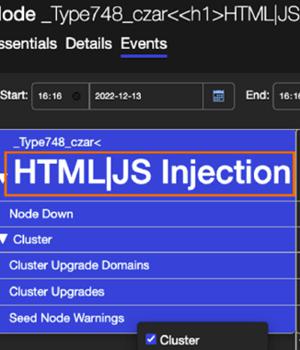Security News > 2023 > March > Researchers Detail Severe "Super FabriXss" Vulnerability in Microsoft Azure SFX

Details have emerged about a now-patched vulnerability in Azure Service Fabric Explorer that could lead to unauthenticated remote code execution.
Tracked as CVE-2023-23383, the issue has been dubbed "Super FabriXss" by Orca Security, a nod to the FabriXss flaw that was fixed by Microsoft in October 2022.
"The Super FabriXss vulnerability enables remote attackers to leverage an XSS vulnerability to achieve remote code execution on a container hosted on a Service Fabric node without the need for authentication," security researcher Lidor Ben Shitrit said in a report shared with The Hacker News.
While both FabriXss and Super FabriXss are XSS flaws, Super FabriXss has more severe implications in that it could be weaponized to execute code and potentially gain control of susceptible systems.
Super FabriXss, which resides in the "Events" tab associated with each node in the cluster from the user interface, is also a reflected XSS flaw, meaning the script is embedded into a link, and is only triggered when the link is clicked.
"The vulnerability is in the web client, but the malicious scripts executed in the victim's browser translate into actions executed in the cluster," Microsoft noted in its advisory.
News URL
https://thehackernews.com/2023/03/researchers-detail-severe-super.html
Related news
- Microsoft Patches 125 Flaws Including Actively Exploited Windows CLFS Vulnerability (source)
- Microsoft: Windows CLFS Vulnerability Could Lead to ‘Widespread Deployment and Detonation of Ransomware’ (source)
- Microsoft Secures MSA Signing with Azure Confidential VMs Following Storm-0558 Breach (source)
- Researchers Identify Rack::Static Vulnerability Enabling Data Breaches in Ruby Servers (source)
- Microsoft Fixes 78 Flaws, 5 Zero-Days Exploited; CVSS 10 Bug Impacts Azure DevOps Server (source)
- Week in review: Microsoft patches 5 actively exploited 0-days, recently fixed Chrome vulnerability exploited (source)
Related Vulnerability
| DATE | CVE | VULNERABILITY TITLE | RISK |
|---|---|---|---|
| 2023-03-14 | CVE-2023-23383 | Unspecified vulnerability in Microsoft Azure Service Fabric 9.1 Service Fabric Explorer Spoofing Vulnerability | 4.7 |